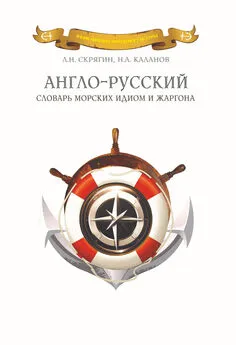Adam Makkai - Словарь американских идиом: 8000 единиц
- Название:Словарь американских идиом: 8000 единиц
- Автор:
- Жанр:
- Издательство:неизвестно
- Год:неизвестен
- ISBN:нет данных
- Рейтинг:
- Избранное:Добавить в избранное
-
Отзывы:
-
Ваша оценка:
Adam Makkai - Словарь американских идиом: 8000 единиц краткое содержание
Это обновленное и дополненное издание, содержащее более 8000 идиоматических
слов и выражений, причем каждое из которых снабжено грамматическим объяснением
и практическим примером. Словарь содержит лексемные идиомы, фразеологические
единицы и поговорки, имеющие особенное значение. В нем приведены наиболее
употребительные выражения только американского английского языка. Этот словарь — идеальное пособие для студентов, часто разъезжающих бизнесменов и просто
путешественников.
Словарь американских идиом: 8000 единиц - читать онлайн бесплатно полную версию (весь текст целиком)
Интервал:
Закладка:
[run a tight ship] {v. phr.} To run an organization with a firm hand, with strict rules and regulations. •/ Our dean of the college runs a very tight ship; he tolerates no mistakes. /
[run away]or [run off] {v.} To leave and not plan to come back; go without permission; escape. •/ Many times Tommy said he would run away from home, but he never did. / •/ The guards in jail make sure that none of the prisoners run away. / Compare: GET AWAY.
[run away with] {v.} 1a. To take quickly and secretly, especially without permission; steal. •/ A thief ran away with Grandma’s silver teapot. / Syn.: MAKE OFF. 1b. To go away with; elope. •/ Mary said that if her parents wouldn’t let her marry Phil, she would run away with him. / 1c. To take hold of; seize. •/ The boys thought they saw a ghost in the old house last night; they let their imagination run away with them. / Compare: GET THE BETTER OF. 2. To be much better or more noticeable than others in; win easily. •/ Our team ran away with the game in the last half. / •/ The fat comedian ran away with the TV show. / Compare: STEAL THE SHOW.
[run circles around]also [run rings around] {v. phr.} To show that you can do a task much better than; do better than (someone) very easily. •/ In spelling, Ruth could run circles around Barbara any day. / •/ Frank ran rings around the other boys on the basketball team. /
[run down] {v.} (stress on "down") 1. To crash against and knock down or sink. •/ Jack rode his bicycle too fast and almost ran down his little brother. / •/ It was so foggy that the steamship almost ran down a small boat leaving port. / Compare: RUN INTO(3a). 2a. To chase until exhausted or caught. •/ The dogs ran down the wounded deer. / 2b. To find by hard and thorough search; also: trace to its cause or beginning. •/ The policeman ran down proof that the burglar had robbed the store. / Compare: HUNT DOWN. 2c. To catch (a base runner) between bases and tag out in baseball. •/ The pitcher saw that the base runner was not on base, so he surprised him by throwing the ball to the first baseman, who ran him down before he reached second base. / 3. {informal} To say bad things about; criticize. •/ Suzy ran down the club because the girls wouldn’t let her join. / Compare: FIND FAULT. 4. To stop working; not run or go. •/ The battery in Father’s car ran down this morning. / •/ The kitchen clock ran down because we forgot to wind it. / 5. To get into poor condition; look bad. •/ A neighborhood runs down when the people don’t take care of their houses. /
[run-down] {adj.} (stress on "run") In poor health or condition; weak or needing much work. •/ Grandma caught a cold because she was very run-down from loss of sleep. / •/ The houses near the center of the city get more run-down every year. /
[run dry] {v. phr.} To dry up; lose the water content. •/ After many years of use, our well ran dry. /
[run errands] {v. phr.} To carry messages or perform similar minor tasks. •/ Peter runs errands for our entire neighborhood to make some extra money. /
[run for it]or [make a run for it] {v. phr.} To dash for safety; make a speedy escape. •/ The bridge the soldiers were on started to fall down and they had to run for it. / •/ The policeman shouted for the robber to stop, but the robber made a run for if. /
[run for one’s money] {n. phr.} 1. A good fight; a hard struggle. — Usually used with "give" or "get". •/ Our team didn’t win the game, but they gave the other team a run for their money. / 2. Satisfaction; interest; excitement. — Usually used with "give" or "get". •/ People like to watch the champion fight because they get a good run for their money from him. / •/ A good student gives a teacher more than a run for his money. /
[run in] {v. phr.} 1. {informal} To take to jail; arrest. •/ The policeman ran the man in for peddling without a license. / 2. To make a brief visit. •/ The neighbor boy ran in for a minute to see Bob’s newest model rocket. / Syn.: DROP IN. Compare: STOP OFF.
[run-in] {n.} 1. A traffic accident. •/ My car was wrecked when I had a run-in with a small truck. / 2. A violent quarrel. •/ John had a nasty run-in with his boss and was fired. /
[run in the blood]or [run in the family] {v. phr.} To be a common family characteristic; be learned or inherited from your family. •/ A great interest in gardening runs in his family. / •/ Red hair runs in the family. /
[run into] {v.} 1. To mix with; join with. •/ If the paint brush is too wet, the red paint will run into the white on the house. / •/ This small brook runs into a big river in the valley below. / 2. To add up to; reach; total. •/ Car repairs can run into a lot of money. / •/ The number of people killed on the highways during holidays runs into hundreds. / •/ A good dictionary may run into several editions. / 3a. Bump; crash into; hit. •/ Joe lost control of his bike and ran into a tree. / Compare: RUN DOWN. 3b. To meet by chance. •/ I ran into Joe yesterday on Main Street. / Compare: BUMP INTO, CHANCE ON, COME ACROSS(2). 3e. Be affected by; get into. •/ I ran into trouble on the last problem on the test. / •/ When I ran into a problem while making my model airplane, I asked Uncle Mark for help. /
[run into a brick wall]or [run into a stone wall]See: STONE WALL.
[run into the ground] {v. phr.} , {informal} 1. To do or use (something) more than is wanted or needed. •/ It’s all right to borrow my hammer once in a while, but don’t run it into the ground. / 2. To win over or defeat (someone) completely. •/ We lost the game today, but tomorrow we’ll run them into the ground. /
[run its course] {v. phr.} To fulfill a normal development; terminate a normal period. •/ Your flu will run its course; in a few days you’ll be back on your feet. /
[run off] {v. phr.} 1. To produce with a printing press or duplicating machine. •/ The print shop ran off a thousand copies of the newspaper. / 2. To drive away. •/ The boys saw a dog digging in mother’s flower bed, and they ran him off. / •/ When the salesman tried to cheat the farmer, the farmer ran him off the farm with a shotgun. / 3. See: RUN AWAY.
[run-off] {n.} A second election held to determine the winner when the results of the first one were inconclusive. •/ The senatorial race was so close that the candidates will have to hold a run-off. /
[run off at the mouth] {v. phr.} To talk too much; be unable to stop talking. •/ "Shut up, John," our father cried. "You are always running off at the mouth." /
[run of luck] {n. phr.} A period of good luck. •/ I had a run of luck last Saturday when I went fishing and caught seven big trout within one hour. /
[run-of-the-mill]or [run-of-the-mine] {adj.} Of a common kind; ordinary; usual. •/ Frank is a very good bowler, but Joe is just run-of-the-mill. / •/ It was just a run-of-the-mine movie. /
[runner-up] {n.} The person who finishes second in a race or contest; the one next after the winner. •/ Tom won the race and Jack was runner-up. / •/ Joan was runner-up in the contest for class secretary. / Compare: SECOND-BEST.
[running start] {n. phr.} Good progress at the beginning. •/ The team was off to a running start, having won the first two games. / •/ Contributions of $5000 before the drive began gave the charity fund a running start. / Compare: HEAD START.
[run out] {v.} 1a. To come to an end; be used up. •/ Jerry almost got across the brook on the slippery stones but his luck ran out and he slipped and fell. / •/ We’d better do our Christmas shopping; time is running out. / Syn.: GIVE OUT(5). 1b. To use all of the supply; be troubled by not having enough. •/ The car ran out of gas three miles from town. / •/ Millie never runs out of ideas for clever party decorations. / Compare: RUN SHORT. 2. {informal} To force to leave; expel. •/ Federal agents ran the spies out of the country. / Syn.: KICK OUT, RUN OFF.
[run out on] {v. phr.} To leave someone in the lurch; abandon another. •/ When Ted ran out on Delores, she got so angry that she sued him for divorce. /
[run over] {v.} 1. To be too full and flow over the edge; spill over. •/ Billy forgot he had left the water on, and the tub ran over. / 2. To try or go over (something) quickly; practice briefly. •/ During the lunch hour, Mary ran over her history facts so she would remember them for the test. / •/ The coach ran over the signals for the trick play with the team just before game time. / 3. To drive on top of; ride over. •/ At night cars often run over small animals that are blinded by the headlights. / Syn.: RUN DOWN.
[run ragged] {v. phr.} To tire out; make nervous by too much worry or work. •/ Trying to keep up with too many clubs, sports, and activities in addition to his homework ran Tom ragged. / •/ On a rainy day the children sometimes ran Mother ragged. / Compare: WEAR OUT.
[run rings around]See: RUN CIRCLES AROUND.
[run riot] {v. phr.} 1. To act freely or wildly; not control yourself. •/ The monkey got out of his cage and ran riot in the pet shop. / •/ John let his imagination run riot, thinking he was hunting lions in Africa. / 2. To be or grow in great numbers or large amounts. •/ Daisies ran riot in the meadow. / Compare: RUN WILD.
[run scared] {v. phr.} To expect defeat, as in a political campaign. •/ The one-vote defeat caused him to run scared in every race thereafter. /
[run short] {v. phr.} 1. To not have enough. •/ Bob asked Jack to lend him five dollars because he was running short. / •/ We are running short of sugar. / Compare: RUN OUT. 2. To be not enough in quantity. •/ We are out of potatoes and the flour is running short. /
[run that by me again!] {v. phr.} , {informal command} Repeat what you just said, as I couldn’t understand you. •/ "Run that by me again," he cried. "This telephone connection is very bad." /
[run the gauntlet]also [gantlet] {v. phr.} 1. To be made to run between two lines of people facing each other and be hit by them with clubs or other weapons. •/ Joe had to run the gauntlet as part of his initiation into the club. / 2. To face a hard test; bear a painful experience. •/ Ginny had to run the gauntlet of her mother’s questions about how the ink spot got on the dining room rug. /
Читать дальшеИнтервал:
Закладка:







